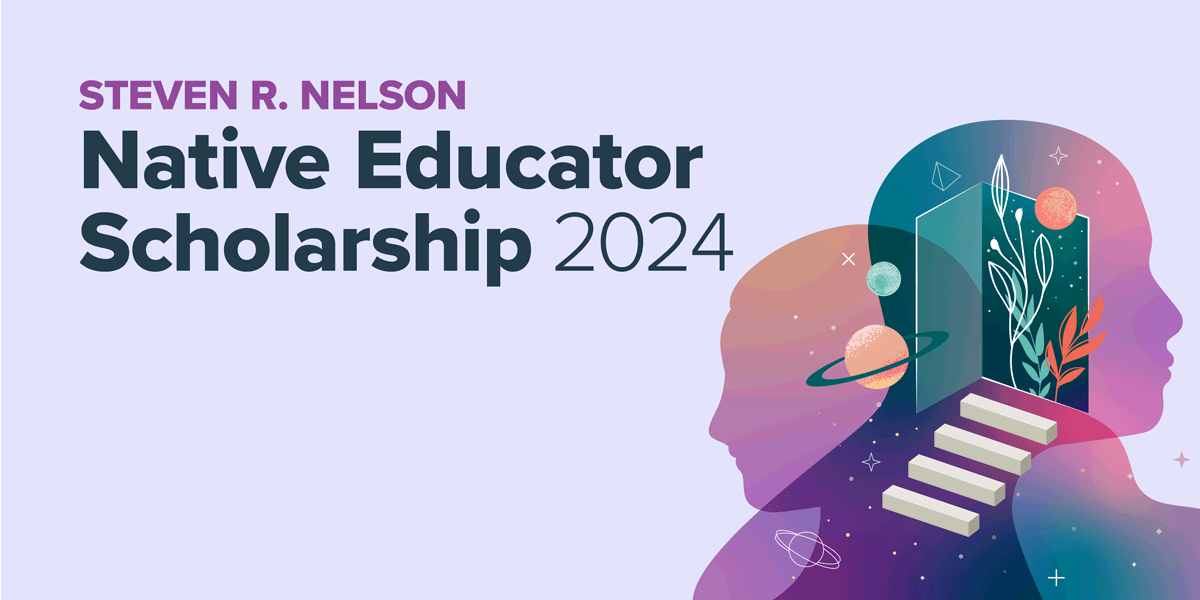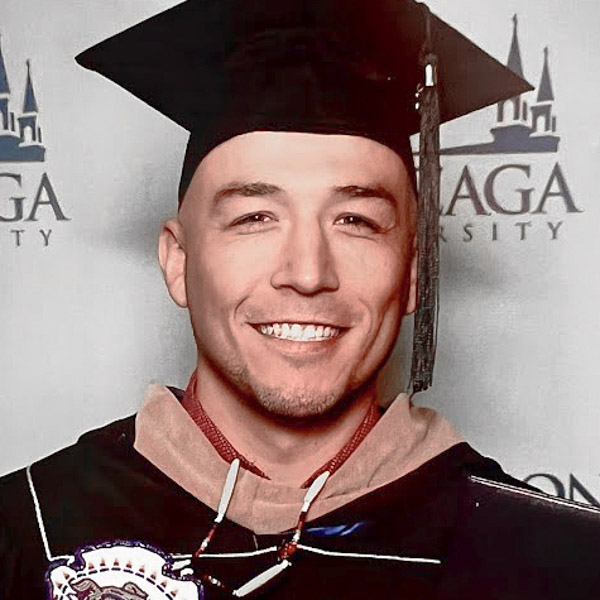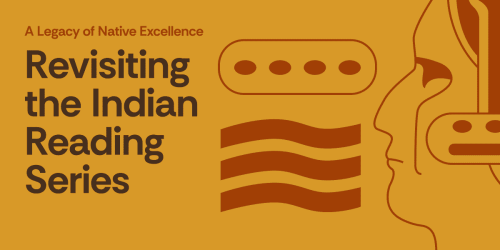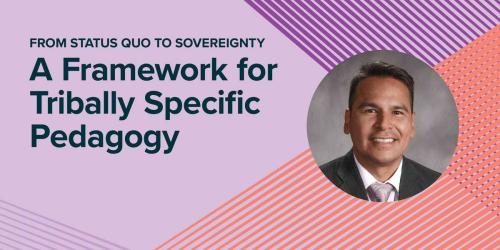Looking Ahead in Native Ed: Celebrating the 2024 Nelson Scholars

The Nelson Scholarship supports Native students in the Northwest who are pursuing an advanced degree in education, education policy, leadership, technical assistance, research, or a closely related field.
We are honored to award this scholarship each year to help increase Native representation in education.
The Nelson Scholars for 2024 are:
- Eva Flying, Montana State University, Bozeman
- Rosemary Matt, Montana State University
- Cary Rosenbaum, Washington State University
- Winona Stevens, University of Washington, Tacoma/Muckleshoot Tribal College
- Tiffany Stuart, University of Arizona
Join us in congratulating all five scholarship recipients! Get to know them below.
Eva Flying
Northern Cheyenne
Doctor of Education Leadership, Montana State University, Bozeman

Twelve years ago, Eva Flying set out to be president of Chief Dull Knife College, a Tribal college in rural southeast Montana—an office she holds today. “I didn’t know how I would get here,” she says, “but it was written down. I wanted to contribute and be the one to bring others together for our Tribal communities.” Now that Eva has achieved her goal of leading the college in her community, she is seeking more ways to influence systems change. Her next move, with the support of the Nelson Scholarship, is to pursue a doctoral degree in education leadership at Montana State University.
Eva’s own journey has motivated her to create more opportunities for members of her community to stay at home. “I believe that education is there to help improve the infrastructure and the socioeconomic base of our communities. I would like all our students to be able to have jobs in our community if they choose,” she says. Her message to the next generation is to “keep as your foundation the necessity of preserving our Cheyenne culture and our language. Everything that we do as a tribal people is for the people and is grounded in culture,” she says. “This is a way of knowing and way of being and is a way of life.”
I would like all our students to be able to have jobs in our community if they choose.
—Eva Flying
Rosemary Matt
Séliš/Qlispé
Doctor of Education Leadership, Montana State University

Having worked in various educational systems, Rosemary Matt made up her mind to pursue higher education so that she could support positive change in Tribal communities. “It’s time for our Tribal communities to fully lead our educational systems and create schools where Native children are celebrated every day!” she says.
Rosemary credits the influence of the Native women who surrounded her when she was growing up—her mother, aunts, and grandmother—for her interest in pursuing education. “I always knew I was going to go to college,” she says, “it was just where and what I would study. These women continue to be my greatest role models, support and most influential teachers.”
With her doctoral degree, Rosemary hopes to serve as a role model and support the next generation of Tribal community members who will pursue higher education. She is also eager to help provide new educational opportunities for her community. “Creating community language and culture schools is what we need to do to regain our culture and language,” she says “and provide an educational system that will meet the needs of our Tribal community.”
It’s time for our Tribal communities to fully lead our educational systems and create schools where Native children are celebrated every day!
—Rosemary Matt
Cary Rosenbaum
Confederated Tribes of the Colville Reservation
Doctor of Educational Leadership, Washington State University

As a kid growing up on the Colville Reservation, Cary Rosenbaum watched the Seattle Supersonics, Mariners, and Seahawks religiously on his family’s 20-inch television. “I will be there someday,” he told himself, “or as close as I can be.” He knew that higher education was his pathway. He studied journalism and was able report at a Sonics game in their final season, sit in the Mariners’ visiting dugout and interview Jacoby Ellsbury (the first Major League Baseball player of Navajo descent), and cover a handful of pro and college events at what’s now Lumen Field. “Manifesting something like that may mean nothing to some,” he says, “but to this rez boy that was everything.”
After a 14-year gap, Cary returned to school to complete an MBA in 2022. “Working on that during the pandemic gave me time to reflect on my life,” he says. “I realized I was greatly blessed to have educators and mentors who encouraged me to succeed in higher education and have a nice career. Perhaps I could become that—at the very least, for my own people. Or more, depending on what Creator has in store for me.”
Now, Cary hopes to use his research and writing skills to add to the body of academic work helping to improve life in Indian Country. “I am fascinated by the history of Native education because there is a long, traumatic history that I believe affects Indigenous students to this day,” he says. “The past is not far removed from today’s students and America owes it to Indigenous people to educate them to a much better degree at all levels—but it also needs help from Indigenous experts to understand how to do that.”
The past is not far removed from today’s students and America owes it to Indigenous people to educate them to a much better degree at all levels—but it also needs help from Indigenous experts to understand how to do that.
—Cary Rosenbaum
Winona Stevens
Ho-Chunk Nation of Wisconsin
Doctor of Indigenous Educational Leadership, University of Washington, Tacoma/Muckleshoot Tribal College

Winona Stevens will use the support of the Nelson Scholarship to continue her studies in Indigenous Educational Leadership. The program is a partnership between the University of Washington and Muckleshoot Tribal College. Winona’s focus is the criminal justice system and social justice as it relates to Native American and Indigenous incarceration.
Winona is passionate about the healing aspect of Indigenous ways of life. She works with a community of those who have relied Indigenous healing practices such as sweat lodges, smudging, and song to get them through the pain of incarceration. If she could change one thing about the world, she says, it would be to wipe away everyone’s physically manifested trauma. “I'm thinking of women living in pain because of domestic violence, loved ones struggling with addiction, heart-racing anxiety that turns into fear, then violence,” she says. “By being free of that pain, people could focus on their spiritual and mental healing.”
“I believe it is the responsibility of those of us who have the privilege of higher education to protect and support our people who are keeping our Indigenous ways alive for our next generations,” she says. She encourages the next generation of Native students to “throw yourself into your language. I believe our languages will be our great unifier, over enrollment and blood quantum. Regardless of how dark or light you are, the language shapes your worldview and relations with your people.”
I believe it is the responsibility of those of us who have the privilege of higher education to protect and support our people who are keeping our Indigenous ways alive for our next generations.
—Winona Stevens
Tiffany Stuart
Confederated Tribes of Siletz Indians of Oregon
Doctor of Educational Leadership, University of Arizona

Tiffany Stuart traces her educational journey back to her grandmother’s yard, where she learned to feather dance as a small child. “She had us pick up the sticks and use them like madishes [sticks used to feather dance],” she recalls. “This was a gift to me that I realized later in life was very valuable. Education starts within the home. That is where our heart of learning can come from.”
Tiffany has carried on a passion for continuing her Tribal traditions. She writes Tribal stories and shares them with other educators to use in their classrooms. Last fall, she volunteered twice a week with a drum class, sharing how backup singers are part of the drum family. In November the drum group traveled weekly to present about Native American culture to schools and organizations.
Now, Tiffany is pursuing higher education with the goal of serving in leadership positions within the school district and the community. “I hope to help provide trauma-informed and culturally sustaining education to our youth,” she says. Above all, she wants to share a simple message: “Be kind to others. The world will be a better place when we are kind to others.”
Education starts within the home. That is where our heart of learning can come from.
—Tiffany Stuart
Congratulations to all the 2024 Nelson Scholars! The 2025 scholarship application window will be open from November 30, 2024, to March 31, 2025. Visit our Nelson Scholarship page to learn more.
Visit our Native Education page to learn more about Education Northwest’s work in Native Education.



